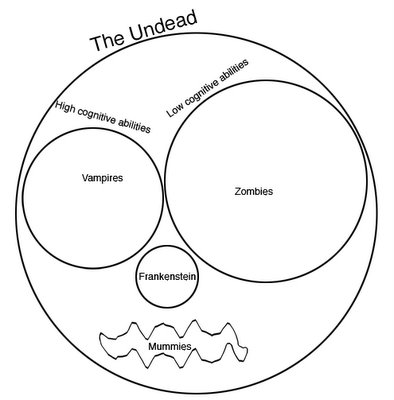The Great Zombie Debate
I knew this would happen eventually.
This all hinges on the definition of zombie, which admittedly is a grey area. Is coming back from the dead the defining characteristic of a zombie? If the definition is that broad then it would include mummies, vampires, frankenstein and a variety of other undead. I would not classify any of those as zombies, well maybe the mummy.
My definition is narrower. Zombies are a subclass of the undead. They are rotting corpses, unable to speak, lacking cognitive abilities and depending on the level of decomposition, have poor motor skills. Depending on the reason they have become zombies, they may create new zombies by killing and/or biting the living.
Vampires are highly intelligent and do not shamble at all. They are immortal unless killed using very specific methods. Methods which are vastly different from those used to kill zombies.
Frankenstein was not very smart and he did shamble. However, he could still be killed using normal methods and he did have basic reasoning skills. If he had bit or killed anyone that person would not have become another Frankenstein. So that excludes him from the zombie club.
Mummies have a very specific purpose. They are alive only to fulfill the curse upon those who have violated the tomb. They shamble and have limited intelligence, but they have one purpose only. Plus like Frankenstein, their attack does not create new mummies.
So I have come up with a Venn Diagram and a Cognitive Abilities Continuum (CAC) to better illustrate my point.

 Having said and illustrated all of that, I will watch movies that are borderline zombie movies. I will not watch vampire, Frankenstein or mummy movies.
Having said and illustrated all of that, I will watch movies that are borderline zombie movies. I will not watch vampire, Frankenstein or mummy movies.
This all hinges on the definition of zombie, which admittedly is a grey area. Is coming back from the dead the defining characteristic of a zombie? If the definition is that broad then it would include mummies, vampires, frankenstein and a variety of other undead. I would not classify any of those as zombies, well maybe the mummy.
My definition is narrower. Zombies are a subclass of the undead. They are rotting corpses, unable to speak, lacking cognitive abilities and depending on the level of decomposition, have poor motor skills. Depending on the reason they have become zombies, they may create new zombies by killing and/or biting the living.
Vampires are highly intelligent and do not shamble at all. They are immortal unless killed using very specific methods. Methods which are vastly different from those used to kill zombies.
Frankenstein was not very smart and he did shamble. However, he could still be killed using normal methods and he did have basic reasoning skills. If he had bit or killed anyone that person would not have become another Frankenstein. So that excludes him from the zombie club.
Mummies have a very specific purpose. They are alive only to fulfill the curse upon those who have violated the tomb. They shamble and have limited intelligence, but they have one purpose only. Plus like Frankenstein, their attack does not create new mummies.
So I have come up with a Venn Diagram and a Cognitive Abilities Continuum (CAC) to better illustrate my point.

 Having said and illustrated all of that, I will watch movies that are borderline zombie movies. I will not watch vampire, Frankenstein or mummy movies.
Having said and illustrated all of that, I will watch movies that are borderline zombie movies. I will not watch vampire, Frankenstein or mummy movies.

5 Comments:
Do you have an opinion on fast zombies? I know there is some debate that fast zombies disobey one of the rules.
I can accept fast zombies depending on how long the body had been dead. A fresh corpse would still be able to move at the same speed as a living human. A decaying corpse would not though.
Does this mean you will watch "The Passion of the Christ" since Jesus comes back from the dead? He was a pretty fast zombie.
No. He scored high on the CAC. He doesn't shamble. When he bites people they don't turn into other Christs. He was resurrected and was alive again. Which is different than being a living-dead.
This is an online comic that I read most days. Today's was related to the Christ/Zombie question.
Christ/Zombie
Post a Comment
<< Home